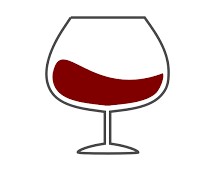29 September 2022
Boring Moderation
Could be the answer.
By Lynda Goetz

A character in Somerset Maugham’s novel Cakes and Ale decries the old adage ‘Enough is as good as a feast’, saying essentially that those who regard this as true must be boring personalities who believe in moderation. In many ways this view is quite possibly correct, but in the days of endless surveys and research there does appear to be a great deal of support for the idea that, at least as far as food and drink are concerned, moderation may well be the healthiest option. However, do we really want to keep reading the supporting evidence and statistics for this middle-of-the-road way of life?
The Daily Telegraph recently provoked mirth from its letter writers by an opening line to an article which read, ‘Drinking just two cups of tea per day could lower your risk of mortality by 10 per cent, a study suggests’. Letter writers the following day pointed out that as far as they were aware, the risk of mortality was 100% and remained so whatever you chose to eat, drink or do.
We are regularly bombarded with surveys which purport to advise on what to eat or drink, the amounts we should consume and even at what time of day. Is any of this really helpful and how much notice do readers and the general public pay to such pronouncements? Many such surveys are in fact funded by interested parties, organisations or companies. Sometimes this is transparent and at others it is not. It occasionally does seem extraordinary that information which many would regard as common sense is announced and confirmed with fanfare which appears to suggest that the news is a novel scientific breakthrough.
The news about tea drinking has been around for a while but was confirmed at the beginning of 2020 following a Chinese study reported in Science Daily. The participants however were mainly drinking green tea, whereas the study conducted by the National Institutes of Health and reported in August this year used information from the UK Biobank and participants who were mainly drinking the black tea more popular here. A few days ago, it was the turn of coffee. ‘Coffee drinkers live longer and have healthier hearts, a study has revealed’, trumpeted The Sun. According to this latest study, drinking two or three cups of coffee a day is actually good for you rather than the opposite. Over the years reports on the effects of drinking coffee appear to have been very mixed. It would seem not unreasonable to conclude that perhaps drinking or not drinking these things might end up being a personal choice, given how we all react differently. Some people suffer insomnia if they drink coffee in the evening, others can drink it quite happily and still get a good night’s sleep in spite of the caffeine kick. The American National Library of Medicine published a review article as long ago as 2011 suggesting that although ‘reliable evidence is becoming available supporting its health promoting potential’ it was nevertheless helpful to ‘disseminate general information, health claims, and obviously the risk factors associated with coffee consumption to scientists, allied stakeholders, and certainly readers’.
What about wine? The science website Zoe suggests that ‘there is evidence that drinking red wine in moderation may have health benefits.’ The article goes on to say; ‘Many of the potential health benefits of red wine are based on its high levels of plant nutrients called polyphenols, which have anti-inflammatory and antioxidant properties’. Polyphenols are also found in tea and coffee. Although red wine is slightly better for you than white wine (in moderation, of course!), as it has higher amounts of some vitamins and minerals, it is lower in calories, which some see as beneficial. As always, the benefits come with caveats: eg wine may contain lower calories than other alcoholic beverages, but it may contribute to weight gain as it contains calories but doesn’t provide any feeling of fullness; it may help prevent certain types of cancer, but may be associated with an increased risk of others etc. etc.
As for food rather than drink, the current push appears to be strongly towards a vegetarian or even vegan diet. Once again, those advocating a move away from meat often have their own agendas or deeply held beliefs and moderation would appear to be the answer. A diet heavy in red meat or processed meat does, from all the research to date, appear to show an increased risk of bowel cancer, as well as increased risk of cardiovascular disease and type 2 diabetes. Yet even here the results of studies differ and there is no absolute consensus, as indicated in an article published by The American Diabetes Association. Once again, we come back to boring moderation, or as Diabetes UK put it, ‘Red meat is a good source of some nutrients, such as protein, iron, zinc and vitamin B12. It’s just about being sensible, and not eating too much, too often‘ (my underlining).
There is also the question of all those faddy diets which get their 15 minutes of fame: the Keto diet, the Paleo diet, the Grapefruit diet and variations advice and articles on all of the above. Looking up Nutrition and Dieting on The Telegraph website I found 26 articles, all written in the last couple of months, with titles varying from ‘Why Vegan food isn’t always the most sustainable or healthy choice in 2022’, to ‘Revealed: the time you should stop eating to lose more weight’ via ‘Three easy ways to cut calories without dieting’ , ‘Why extra salt could take years off your life’ and ‘The seven secrets of naturally skinny people’ (basically they eat less than most people).
It would seem that as obesity and obesity-related illness becomes more of a problem and modern lifestyles lead to binge eating and binge drinking, we perhaps DO want to read about these matters, but that on the whole, the majority are doing very little to change their approach to the wide and easy availability of ‘irresistible’ food and drink. An availability which, as Jemima Lewis pointed out in a recent article, means that because ‘the human appetite evolved when food was scarce, so we are programmed to gorge on high-calorie treats’ is resulting in the epidemic of obesity we are now facing. However, her conclusion appears to be that some sort of ‘systemic’ change is required as education and individual willpower is not the answer. This is puzzling as it is hard to envisage what sort of ‘top-down’ regulations are going to solve such issues. Why would moderation not be the answer? I personally am not in favour of eschewing wine, tea or coffee in favour of cups of hot water (although I have several friends who do), nor of giving up the odd pizza night, slice of home-made cake or the occasional mug of cocoa or piece of chocolate, but ‘enough is as good as a feast’ – even if it does make me a dull human being!


